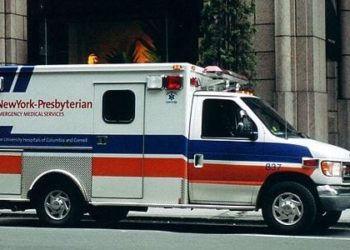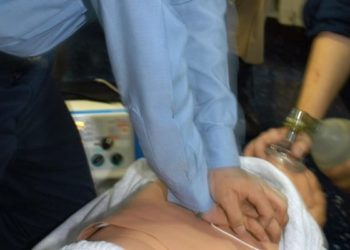Antiarrhythmic drugs have no survival benefit in shock-refractory out-of-hospital cardiac arrest
1. In this randomized controlled trial, administration of amiodarone or lidocaine did not provide a significant improvement in survival or neurological outcomes as compared to placebo in patients with shock-refractory out-of-hospital cardiac arrest.
2. There was a trend towards significance in the amiodarone vs. placebo comparison and it is unclear if the study’s initial amiodarone dosing of 150mg may have impacted these results.
Evidence Rating Level: 1 (Excellent)
Study Rundown: Good-quality compressions and correct application of defibrillation are the only interventions that have mortality benefit in a cardiac arrest. Although the ACLS guidelines instruct one to give antiarrhythmic drugs like amiodarone or lidocaine, there has been no survival benefit. This randomized, double-blind trial aimed to determine the effect of amiodarone, lidocaine compared to saline placebo in adults with nontraumatic out-of-hospital shock-refractory cardiac arrest on survival and favourable neurological outcome.
Administration of the antiarrhythmics amiodarone or lidocaine did not have significant improvement on survival or neurological outcomes as compared to placebo. There was a trend towards significance in the amiodarone vs. placebo groups in both survival to discharge and neurological function at discharge. Of note is that the 2015 ACLS guidelines suggest an initial amiodarone loading dose of 300 mg. The study does not describe the reasons why the authors decided on using an initial dosing of 150 mg for amiodarone instead. Given the trend towards significance in comparing amiodarone and normal saline, it is unclear if this dosing change would have altered the study’s outcomes.
Click to read the study, published today in NEJM
Relevant Reading: 2015 American Heart Association Guidelines update for Cardiopulmonary Resuscitation and Emergency Cardiovascular Care
In-Depth [randomized controlled trial]: This randomized, double-blind trial was conducted at 10 North American sites from May 2012 to October 2015. Paramedics from these locations enrolled adult patients with nontraumatic out-of-hospital cardiac arrest and that had shock-refractory ventricular fibrillation (VF) or pulseless ventricular tachycardia (VT). The arrest was defined as shock-refractory if one or more shocks were used and the rhythm was nonterminating or recurrent after successful termination. These patients also required IV or IO vascular access. Patients were randomly assigned 1:1:1 to receive lidocaine, amiodarone or normal saline. All patients received the same standard post-cardiac care. The primary outcome was survival to hospital discharge. Secondary outcome was favourable neurological function at discharge as defined by the modified Rankin score. The primary analysis was per-protocol.
A total of 3026 patients were randomly assigned to amiodarone (N=974), lidocaine (N=993) or placebo (N=1059). The percentages of patients surviving to discharge were 24.4%, 23.7% and 21%, respectively. The difference in survival rate for amiodarone vs. placebo was 3.2% (95% [CI]: -0.4 to 7.0; p=0.08), lidocaine vs. placebo 2.6% (95% [CI]: -1.0 to 6.3; p=0.16) and between amiodarone and lidocaine 0.7% (95% [CI]: -3.2 to 4.7; p=0.70). Difference in neurological function at discharge for amiodarone vs. placebo was -0.14% (95% [CI]: -0.30 to 0.02; p=0.09), lidocaine vs. placebo -0.06% (95% [CI]: -0.22 to 0.10; p=0.45) and amiodarone vs. lidocaine -0.08% (95% [CI]: -0.24 to 0.08; p=0.34).
Image: PD
©2016 2 Minute Medicine, Inc. All rights reserved. No works may be reproduced without expressed written consent from 2 Minute Medicine, Inc. Inquire about licensing here. No article should be construed as medical advice and is not intended as such by the authors or by 2 Minute Medicine, Inc.






